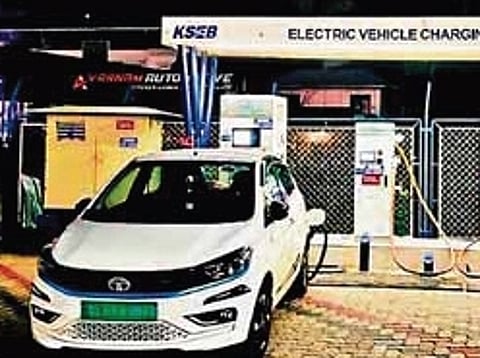

KOLLAM: The sale of electric vehicles (EVs) in Kerala is on a rocky road.
Once on the surge, EV adoption in the state has dropped considerably this year, as well as in 2024, for reasons ranging from high costs and insufficient charging infrastructure to absence of government incentives as well as alleged red tapism.
Data from the Union Ministry of Road Transport and Highways revealed that EV sales in the state dropped from 75,808 units in 2023 to 60,345 in 2024. Kerala was ranked 10th among other states in EV sales last year.
Moreover, this year, only 7,906 EVs were sold until April 29, a steep drop from 29,892 EVs sold during the same period last year, taking the state to the 11th spot in India.
Industry experts attributed the slowdown to several factors, including high upfront costs, inadequate charging infrastructure, persistent range anxiety, and lack of strong government incentives. Limited access to public and home charging stations, especially in rural areas where installation is costlier and more complex, also remained a concern.
Reji M, the president of Electric Vehicle Owners Kerala, which has installed 45 EV charging stations across Kerala, criticised the state government’s alleged lack of initiative and cited bureaucratic hurdles within the Kerala State Electricity Board (KSEB) as a major roadblock for EV adoption.
People waiting for EV price drop: Industry observers
“Setting up a charging station requires their (KSEB’s) permission, and the process is often delayed, especially over pricing nod. Some KSEB officials are supportive, others not so. On several occasions, KSEB has directed us to set up a 100 kW station when we intended to install 30 kW one. For stations 60 kW and above, they demand we install our own transformer. This can cost over Rs 6 lakh,” Reji told TNIE.
He said the government is now raising the tax on EVs. “On the one hand, there’s no infrastructure. On the other, it is increasing people’s financial burden. How can EV adoption sustain in Kerala when states like Karnataka and Tamil Nadu offer 0% tax? This shows the government doesn’t want EVs to grow in Kerala. And we cannot accept that,” he said.
KSEB sources responded that clearances for 30 kW stations are generally processed within a day or two, but admitted to delays for higher-capacity stations.
“Setting up 60 kW charging stations requires transformers. It is either installed by the KSEB if the private party pays, or the latter can do it themselves. If KSEB installs the transformer, it takes 15 to 20 days. Some of our own stations, especially those set up with Chinese firm OKAI for promotional use, are non-functional at present due to increased load. Later, we set up our own charging stations across Kerala. Some have malfunctioned and work on them is on.
They will be functional soon,” said a KSEB source. Industry observers say consumers are also waiting for price drops, contributing to the sluggish sales. In Kerala, EVs cost between Rs 10 lakh and Rs 20 lakh, while the price of petrol and diesel vehicles starts from around Rs 4.5 lakh.
“People love EVs but find them expensive compared to internal combustion vehicles. Union Transport Minister Nitin Gadkari recently said EV prices would soon match those of petrol vehicles. So, customers are waiting, hoping for better pricing and infrastructure. Sale may pick up again, but the issues with charging stations and bureaucratic red tape remain serious concerns,” said Joel Yohannan, general manager at GOEC, an EV charging network in Kerala.